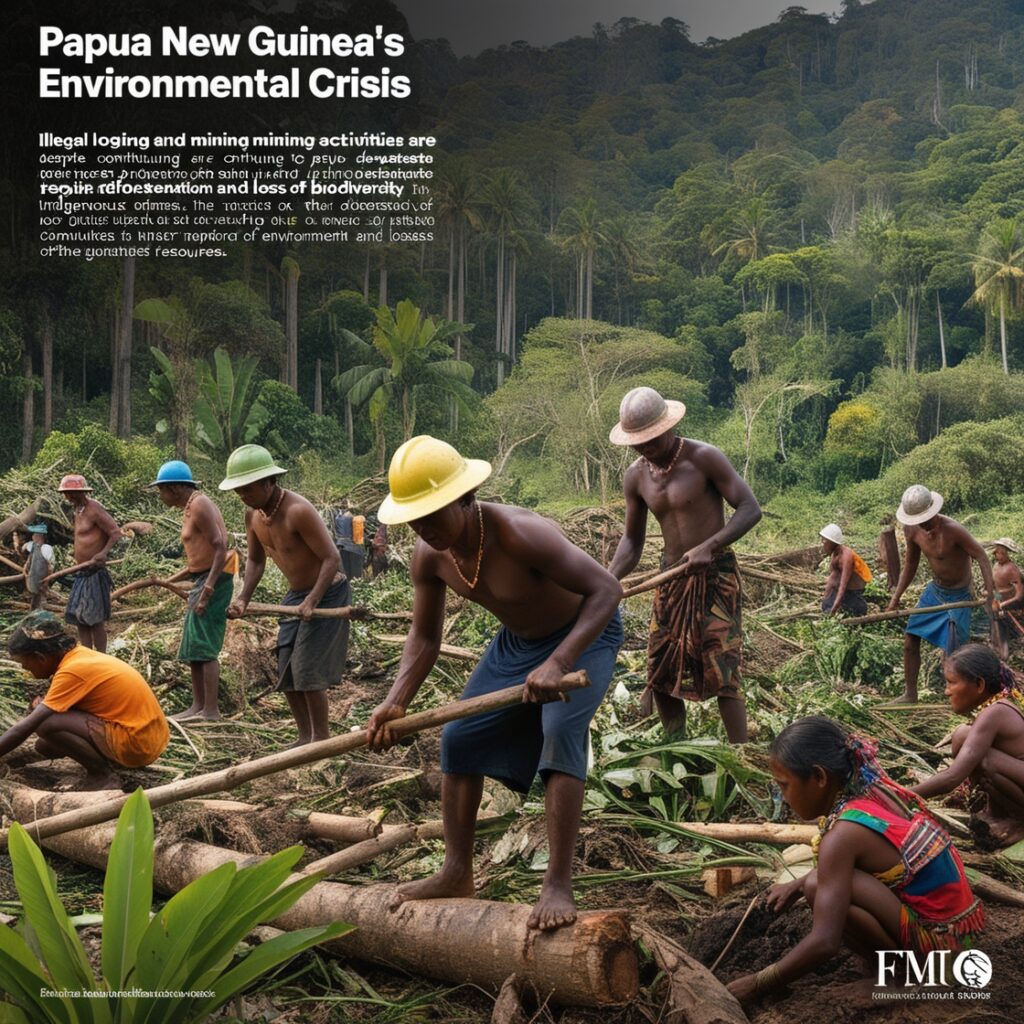Papua New Guinea’s Environmental Crisis Worsens Amid Illegal Logging and Mining
September 23, 2024 – Port Moresby, Papua New Guinea —
Papua New Guinea (PNG) is facing an escalating environmental crisis as illegal logging and mining activities continue to ravage its rich tropical forests. The scale of the deforestation and biodiversity loss has raised concerns among environmental advocates and indigenous communities. However, despite the gravity of the situation, the crisis remains underreported in global media, leaving the affected regions without the attention and support they urgently need.
A Threat to Biodiversity
Papua New Guinea is home to one of the world’s largest rainforests, second only to the Amazon, and hosts 5-7% of global biodiversity. The country's ecosystems are crucial to maintaining the balance of the planet’s natural resources, yet illegal logging and mining operations have continued to strip the land of its trees and disturb wildlife habitats. According to data from Global Forest Watch, the country has lost an alarming 3.2 million hectares of forest between 2001 and 2023, much of it due to these unsanctioned activities. This loss is contributing not only to the decline in species but also to global climate change, as the forests serve as a vital carbon sink.

Environmental groups have reported that indigenous communities are particularly vulnerable. These communities rely on the forests for their livelihoods, cultural practices, and sustenance. With the destruction of their lands, they face the threat of displacement, with many families being forced to leave their ancestral homes.
Illegal Mining Intensifies
Mining, especially for gold and copper, has become another significant contributor to the environmental degradation of Papua New Guinea. Illegal mining operations often proceed with little oversight, leading to unchecked pollution of rivers and soils. Toxic waste from these operations can leach into local water sources, poisoning fish and other wildlife, which are essential for the survival of local communities. According to a report by the World Resources Institute, illegal mining contributes heavily to soil erosion, water contamination, and further loss of biodiversity.
Despite these destructive practices, government oversight has been inconsistent, with many illegal operations going unchecked due to corruption or lack of enforcement. This has led to increased tension between environmental advocates and governmental authorities, who have been criticized for failing to protect the country’s natural resources adequately.
Impact on Indigenous Communities
The indigenous communities of Papua New Guinea are among the hardest hit by this environmental crisis. Many of these groups rely on the forest for traditional hunting, farming, and fishing practices. As their lands are sold off to logging and mining companies, they are being displaced without adequate compensation or relocation assistance. The loss of land also threatens their cultural heritage, as many of their traditional practices are deeply tied to the forests.
The displacement of indigenous peoples has created social instability and increased poverty levels. Without access to their land, many have been forced to migrate to urban areas where they face further challenges, including limited access to education and healthcare.
Global Inaction
Despite the severity of the crisis, global attention has been limited. While international organizations, such as Greenpeace and the World Wildlife Fund, have raised alarms, Papua New Guinea’s environmental crisis has not garnered the same level of global outcry as similar situations in regions like the Amazon or Congo Basin. The lack of media coverage and international pressure has allowed illegal operators to continue their activities largely unchecked.
The United Nations has called for stronger global action to combat illegal logging and mining in Papua New Guinea, emphasizing the need for sustainable development practices that respect both the environment and the rights of indigenous peoples. However, so far, significant policy changes have yet to materialize.
A Call for Sustainable Solutions
Papua New Guinea’s environmental crisis demands immediate global attention. Experts have called for stronger enforcement of environmental protection laws and better cooperation between the government and indigenous communities. Sustainable logging practices, more robust oversight of mining operations, and reforestation initiatives could help mitigate the damage already done and protect the future of Papua New Guinea’s forests.
To ensure the survival of this vital ecosystem, international organizations and governments must step up efforts to provide resources, aid, and pressure to halt the illegal activities driving this environmental disaster.
Sources:
- Global Forest Watch data on Papua New Guinea’s deforestation.
- Reports from environmental advocacy groups like Greenpeace and the World Wildlife Fund.
- World Resources Institute on illegal mining impacts.
